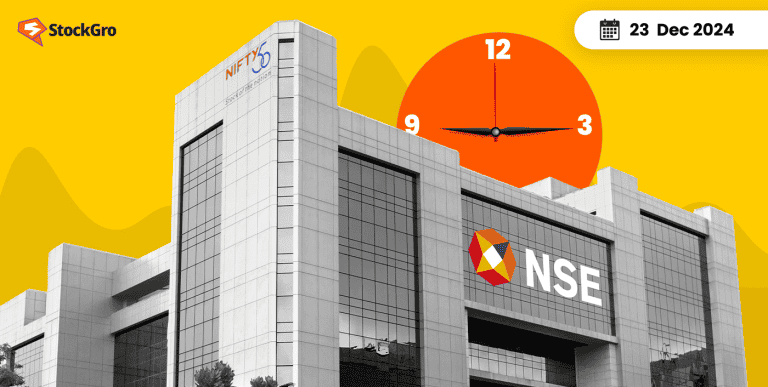
The National Stock Exchange and the Bombay Stock Exchange are the two primary exchanges. Nifty is a stock index belonging to the National Stock Exchange.
The Nifty is a set of fifty highly transacted equities across all sectors. Nifty acts as a benchmark that indicates the functioning of the capital market. A rising Nifty indicates an improving market and vice versa.
However, if Nifty is only an indicator or a benchmark, how can it be traded? When investors trade Nifty, they do not trade on the index itself but on derivatives or other financial products related to the Nifty. A derivative is an agreement which attains its financial worth from an underlying asset. In this case, it is the Nifty.
The ways to trade on Nifty include methods like Nifty futures and Nifty options. Nifty futures refer to a contract that allows investors to buy or sell the Nifty contract at a pre-determined time and a pre-determined price.
Also read: Sensex, Nifty 50 Fall Over 1%: Market Decline Explained.
Nifty options strategies
The traders accede to purchase and sell the Nifty options at a future period at an amount they decided upon in the present. The purchaser of this contract pays a premium and has legal rights to acquire and sell. The buyer may choose not to act if the price is not favourable to them because options are a right, not an obligation and can be exercised at the trader’s discretion. The buyer can trade whenever the price favours them before a pre-determined date.
A call option is used if the investor expects Nifty to rise. A put option is used if Nifty is expected to fall.
For example, the Nifty is at ₹ 24,000. B purchases a call option with a strike price of ₹24,200 and pays a premium of ₹ 150. If the Nifty climbs to ₹ 24,500, his option will become lucrative.
Intraday trading
Intraday trading enables traders to enter and exit a particular asset within the same day. Intraday trading entails closing out all positions prior to the market’s closure. Stocks are purchased not for investing purposes but to benefit from the fluctuation of the stock index. Although it carries some risk, intraday trading is a rapid method to earn from the stock market.
Nifty options intraday– selecting the right pick
Before making an intraday trade, it is important to select the right strategy and take into consideration relevant parameters, some of which are listed below.
Liquidity
The most crucial factor to take into account is market liquidity. One of the most fundamental metrics of liquidity is to consider daily volumes as a fraction of market capitalisation.
Liquidity = Average daily volumes / Market capitalisation
Clear chart patterns
Intraday traders depend significantly on technical charts. There must be a distinct chart pattern. It is impossible to trade a stock that lacks a significant history or follow a clear trend.
Sensitivity to speculation
Intraday traders rely on two elements to trade: chart patterns and sensitivity to market speculations. It is difficult to trade intraday in contracts that do not respond to market speculations.
Also read: Understanding the Differences Between Spin-Offs and Split-Offs.
Guide to intraday Nifty trading
Intraday Nifty trading involves dependence on parameters like volume and price. Here is a comprehensive guide to Nifty intraday trading.
Position
A trader must decide on a contract at the beginning of the trading day and exit before the trading day closes. The trader can take the above factors into account to make a financially prudent choice.
Analysis of the market
An intraday trader must perform a holistic analysis of the market based on volume and volatility.
Volume
Volume refers to the aggregate number of traders that purchase and sell a share during a specific period of time, often a day. A large volume of shares indicates that it is more active. The stock choice should have sufficient trading volume so that it can be sold off.
Volatility
Stock prices must vary enough to allow intraday traders to benefit. Traders should pick a share whose price varies enough to allow them to earn within a day.
These strategies are applicable for both put and call options. Various tools of technical analysis are utilised to make a prudent trade. Traders aim to mitigate risk through various options like stop loss orders.
Conclusion
Most retail traders trade stock options intraday. Options are unstable. When traders see a possibility to make an intraday transaction, they seize it. Short-term traders use price fluctuations in intraday shares and other technical indicators to determine the ideal time to enter or quit a transaction. However, intraday transactions are risky and must be performed after methodical research.
Also read: Mamata Machinery IPO: A complete review.
FAQs
- How to make Nifty intraday options trading?
Intraday trading refers to a trading technique of closing trades before the end of the day. To perform intraday options trading, it is essential to make the right picks. The contract must have sufficient volatility and trading volume. A trader must use the tools of technical analysis to make a prudent financial decision. Intraday trading is risky but highly rewarding. Investor prudence is non-negotiable.
- What is the 9:20 intraday strategy?
The 9:20 approach is a form of straddle technique in which the trader initiates a straddle in Indian markets at 9:20 a.m., shortly after they open. A straddle is an options trading technique in which investors buy both a call and a put option on the same underlying asset with the same strike price and expiration date.
- Can I trade options after 3:15 pm?
The regular trading hour ends at 3.30 pm. It is hard to sell options after 3.15 pm because the market is wrapping up its functioning by then. Options trading allows traders to keep holdings after the market closes. Options trading carries additional risks and necessitates a thorough grasp of the derivatives market.
- What is spot trading?
Spot trading is the practice of purchasing or selling assets in the financial markets quickly or on the spot. The transaction transpires at the current market price, often known as the spot price. Spot trading is the most conventional practice in the stock market.
- How to select stocks for intraday trade?
There are various factors which determine the appropriate stock pick for intraday trade. The stock must possess enough fluctuations and trade volume to enable intraday traders to make sufficient profit. The technical charts of the stock must be present with appropriate historical movement records.

